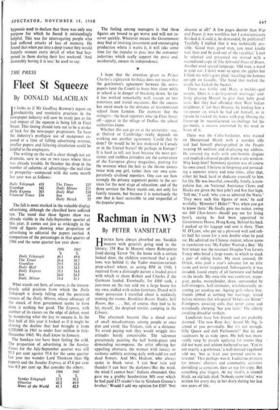THE PRESS
Fleet St Squeeze
By DONALD McLACHLAN
IT looks as if Mr Geoffrey Browne's report on productivity and restrictive practices in the newspaper industry will now be ready just as the real impact of the squeeze is being felt in Fleet Street. This timing should turn out to be a stroke of luck for the newspaper proprietors. To have the industry's profligate use of manpower ex- posed at a time of falling advertising revenue, smaller papers and faltering circulation could be helpful to the employers.
The writing on the wall is clear though not yet dramatic, save in one or two cases where there was already trouble. In October the drop in the number of columns of advertising—the real clue to prosperity—compared with the same month last year was as follows : Daily Telegraph 438 The Times 227 Guardian 342 Daily Mirror 211 Daily Express 303 Daily Mail 210
Financial- Times
234 Sun 83
Daily Sketch 57 The fall is most marked in the valuable display advertising, although the classified have suffered too. The trend that these figures show was already visible in the July-September quarter of this year. It comes out just as strikingly in the form of figures showing what proportion of advertising to editorial the papers carried. A comparison of the percentages in that quarter of 1966 and the same quarter last year show :
1966 1965 Daily Telegraph 46.1 49.6 The Times 28.4 30.7 Guardian 29.5 32.2 Daily Mail 33.8 34.1 Daily Express 35.1 34.8 Sun 24.0 24.5 Daily Mirror 33.4 31.1 What stands out here, of course, is the tremen- dously solid position from which the Daily Telegraph is slowly falling and the persistent success of the Daily Mirror, whose advocacy of the smack of firm government seems to have done it nothing but good. The Express, with another of its causes on the edge of defeat, must be wondering what the key to success is. In the first half of this year it looked as if it might be slowing the decline that had brought it from 4,320,000 in 1961 to under four million in July- December 1965. We shall know in January.
The Sundays too have been feeling the cold. The proportion of advertising in the Sunday Times for the July-September quarter was still 55.3 per cent against 55.4 for the same quarter last year (no wonder Lord Thomson likes big papers) and the Sunday Express at 47.8 per cent was 0.3 per cent up. But consider the others:
1966 1965 Sunday Telegraph 27.8 30.2 Observer • 48.2 49.9 News of the World 41.3
42.5
The feeling among managers is that these figures are bound to get worse and will not re- cover quickly. Whatever means the Government may find of reviving investment and encouraging production where it wants it, it will take some time for the impulse to pass into the consumer industries which really support the press and, incidentally, ensure its independence.
I hope that the attention given to Prince Charles's eighteenth birthday does not mean that the gentlemen's agreement between the news- papers (and the Court) to leave him alone while at school is in danger of breaking down. So far it has worked remarkably well, except on two notorious and trivial occasions. But the success has owed much to the distance of Gordonstoun school from London. The moment that the stringers—the local reporters who tip Fleet Street off—appear in the village of Duffus, the school authorities know.






























 Previous page
Previous page